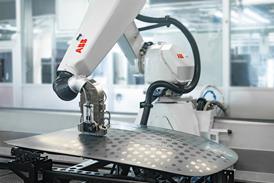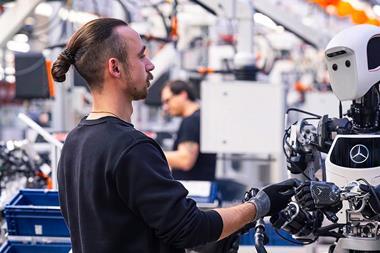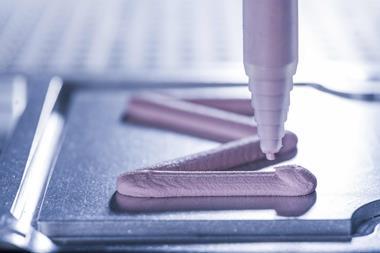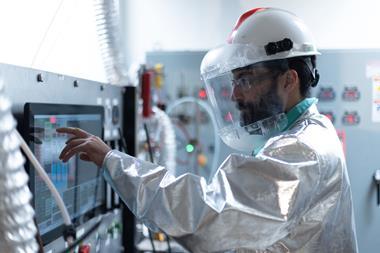With automotive manufacturers looking at ever increasing levels of plastic-based materials content, Steed Webzell examines the challenges for machine shops

Recent research suggests that by 2020 the average car will incorporate 350kg of plastic-based materials. As a result, the need for efficient and economic machining methods for plastics has never been greater; and therein lies the challenge.
The lack of rigidity is the principal difficulty when machining any polymer-based material. All cutting tools rely on the rigid nature of the component being machined, which is why the inherent properties of metals can be leveraged with such good results. In contrast, plastic parts tend to ‘bend’ or ‘flex’ away from the cutting tool during machining, usually deflecting back after the cutter has passed, which makes it hard to achieve the specified dimensions and tolerances.
In a typical car, plastic parts might include bushings, caps, guides, nozzles, spacers and supports, for example, often made from materials such as acetyl, acrylic, Delrin, nylon and polycarbonate, many of which present swarf control issues during machining.
Low frequency solution
Among the companies familiar with the demands of machining plastics is Plastic Turned Parts (PTP), based near Hertford, UK. PTP was the first company in the UK to install a Citizen CNC sliding-head turn-mill centre incorporating patented Low Frequency Vibration (LFV) machining technology. As a result, PTP has been able to eliminate swarf control problems in producing thousands of plastic components.
“For us, the development of LFV has transformed our turn-milling operations so we can now confidently operate the Citizen machine from the start, rather than having to continually interrupt the cycle to clear troublesome ‘birds nesting’ of plastic swarf,” explains managing director Jonathan Newis.
Newis describes LFV as being especially effective during the drilling of deep holes: “We have totally eliminated any clogging of the drill flutes. Previously we often had to set the machine with two or even three drills due to swarf problems, but can now go straight to depth with a single tool and the flutes are completely clean.”
PTP supplies major automotive manufacturers with plastic components in bulk quantities. In addition to PTFE, the plastics-based materials passing through the machine shop are wide ranging, including acetyl, Delrin, nylon, PVC, polypropylene, polyethylene, Nylatron, PEEK, graphite-filled PTFE and other high-performance materials, including variants of glass-reinforced plastics. Batch sizes range between 500 and 10,000.
Says Newis: “We have the skills to respond to the demanding nature of some of these materials”. Reflecting on machining polythylene, he describes this material as “being a nightmare” for swarf wrapping around the tools and often melting on drills. “However, with LFV it readily chips so we can even run unattended for several hours.”
The patented LFV process is different to conventional ultrasonic vibration machining; it is fully programmable and activated through a G-code, enabling on-demand application anywhere in the cutting cycle. Importantly, the servo axes of the machine drive system are ‘oscillated’ in the direction of tool feed in phases that involve tens of microns, which are synchronised with spindle rotation.
Part of the tool path includes ‘air cutting’, which interrupts the cut that breaks the swarf into smaller lengths or pieces. This process also reduces the onset of built-up edge on the tool tip, which is often a cause of premature failure.
It’s possible to program the LFV to tailor the ideal length of swarf through P1 and P2 codes that set the frequency of oscillation. This is a very important benefit as ultra-small chips of plastic would simply build up and clog the machine.”
PTP tends to run the machine spindle at 4000rpm with feed rates of 0.03mm/rev (P1) or 0.05mm/rev (P2). P1 is used for general swarf breaking and P2 for small diameter turning and drilling.
Machining composites
A little further west, in Oxfordshire, Witney-based Shape Machining says that its most recent gains in composites machining have come as a result of software investment. This is why the company is now leveraging the benefits of Vericut CNC machining verification and simulation software from CGTech
Shape Machining was founded by former Formula One chief designer Peter McCool to provide carbon-fibre composite machined tooling and parts to both the motorsport and automotive industries. Vericut software enables Shape’s five-axis programmers and machine operators to verify their toolpaths for clash and collision avoidance.
Says McCool: “Our programmers have adapted quickly and incorporated the running of Vericut into our standard operating procedures. Each time we grow, we need to change and adapt. Introducing Vericut is part of our push to constantly improve.”

NC programs are now written and verified before jobs are loaded on to each machine. This strategy gives Shape the ability to extend significantly the available machining hours in a day, and makes possible the planned introduction of a late and night shift.
Of course, composites such as CFRP and GFRP have a rule book all to themselves when it comes to machining. An interesting observation here is that machining these materials is usually a dry operation. However, machining composites poses many challenges to production engineers: not least the tendency for delamination and split fibres, despite low speed and feed rates. Moreover, cutters are under intense stress as composite fibres can cause rapid wear, resulting in frequent tool changes. To counteract these issues, tools made from PCD or cutters with diamond-like coatings are generally required.
The dry machining of CFRP also raises a number of questions with regard to health and safety. The fine dust released during cutting is a particular cause for concern. To avoid endangering employees, firms must install ventilation and filter systems, which are not cheap.
Lubricants for composites machining
One company working on this problem is Lubricant manufacturer Rhenus Lub. The company says it is performing tests on newly developed coolants assisted by the Research and Transfer Centre at the University of Applied Sciences in Zwickau. Tools and workpieces are inspected for wear and machining quality during suitability tests carried out in a production environment. The first fully developed coolants are Rhenus XY 190 FC and XT 46 FC.
Due to concern about the potential for coolant to penetrate the material, interactions between the coolant and CFRP were studied in a series of tests carried out under worst-case conditions. The results were positive: the short residence time of the coolant during machining did not change the properties of the CFRP, and there were no signs of the coolant penetrating the material.









































